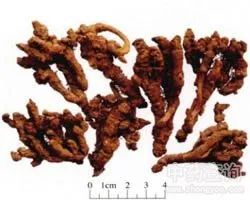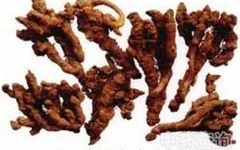
| ➤ Chinese Herbal Properties Inquiry | ➤ Chinese Herbal Compatibility Inquiry |
Huang Lian
【Herbal Name】Huang Lian (Coptidis Rhizoma)
【Alias】Huang Lian, Wang Lian, Wei Lian, Chuan Lian, Ji Zhua Lian.
【English Name】Coptidis Rhizoma.
【Source】The rhizome of the plant Coptis chinensis Franch. from the Ranunculaceae family.
【Properties and Channels】Cold in nature, bitter in taste. Enters the Heart, Spleen, Stomach, Liver, Gallbladder, and Large Intestine meridians.
【Functions and Indications】Clears heat, dries dampness, purges fire, and detoxifies. Classified under heat-clearing herbs as a heat-clearing and dampness-drying herb.

【Plant Morphology】Perennial herb. The rhizome is yellow and often branched. Leaves are all basal, with leathery, tripartite lobes; the central lobe has a petiole, ovate-rhombic, deeply lobed, with sharp serrations on the edges, and the lateral lobes are unevenly deeply lobed. Flowers are borne in 1-2 flower stalks; the inflorescence is terminal, with 3-8 flowers, and the involucral bracts are usually 3, lanceolate, and deeply lobed; the small bracts are round and slightly smaller; sepals are 5, yellow-green, and narrowly ovate; petals are linear-lanceolate with a nectar groove in the center; there are many stamens, with the outer whorl slightly shorter or nearly equal in length to the petals; there are 8-12 carpels, free, with short stalks. The fruit is a capsule with 6-12 seeds, each with a slender stalk. Flowering occurs from February to April, and fruiting from March to June.
【Distribution】Grows in cool, damp, shaded areas in mountainous regions, wild in valleys at altitudes of 1000-1900 meters. Cultivated in high-altitude, cool mountainous areas, particularly in Sichuan.
【Harvesting and Processing】Harvested in autumn, removing fibrous roots and soil, then dried and cleaned of residual fibrous roots.
【Herbal Characteristics】Often clustered, usually curved, resembling chicken claws, with single-stem rhizomes measuring 3-6 cm in length and 0.3-0.8 cm in diameter. The surface is gray-yellow or yellow-brown, rough, with irregular nodular protrusions, fibrous roots, and remnants of fibrous roots. Some nodes are smooth like stems, commonly referred to as “crossing the bridge.” The upper part often retains brown scale leaves, and the tip usually has remnants of the stem or petiole. The texture is hard, with an uneven cross-section; the bark is orange-red or dark brown, and the wood is bright yellow or orange-yellow, arranged radially, with some hollow pith. The aroma is faint, and the taste is extremely bitter.
【Properties and Channels】Cold in nature, bitter in taste. Enters the Heart, Spleen, Stomach, Liver, Gallbladder, and Large Intestine meridians.
【Functions and Indications】Clears heat, dries dampness, purges fire, and detoxifies. Classified under heat-clearing herbs as a heat-clearing and dampness-drying herb.
【Clinical Applications】Dosage of 2-5 grams, decocted for oral administration. Used to treat damp-heat fullness, vomiting with sour regurgitation, diarrhea, jaundice, high fever with delirium, excessive heart fire, blood heat with vomiting or nosebleeds, red eyes, toothache, diabetes, and carbuncles. For external use, apply appropriately for eczema, damp sores, and purulent ear discharge.
【Pharmacological Research】Animal studies indicate that berberine has antibacterial, antiviral, and antiparasitic properties, promotes bile secretion, has anti-diarrheal, anti-inflammatory, anti-cerebral ischemia, antimicrobial, hypotensive, anti-myocardial ischemia, anti-myocardial infarction, anti-arrhythmic effects, inhibits the central nervous system, stops diarrhea, has anti-ulcer effects, promotes bile secretion, lowers blood sugar, inhibits DNA synthesis, and inhibits platelet aggregation.
【Chemical Composition】Contains berberine, as well as coptisine, methylcoptisine, palmatine, jatrorrhizine, epiberberine, and other alkaloids. The authenticity of Huang Lian can be identified using nuclear magnetic resonance hydrogen spectroscopy. Berberine is the main active component in Huang Lian.
【Contraindications】Use with caution in cases of stomach deficiency with vomiting, spleen deficiency with diarrhea, and nocturnal kidney leakage.
【Compatible Formulas】① For pain in the stomach due to excessive consumption of hot foods, or persistent vomiting leading to reverse stomach: Huang Lian 18 grams, Gan Cao (Honey-fried) 3 grams. Prepare one dose, using one large cup of water, decoct to 70% remaining, strain and take warm. (From “Heart Medicine Collection”)
② For stomach pain unresponsive to other treatments, use cold for heat: Huang Lian 18 grams, Fu Zi (Processed, skin and navel removed) 3 grams. Finely chop. Prepare one dose, adding Sheng Jiang (Fresh Ginger) three slices, Da Zao (Jujube) one piece, with one and a half cups of water, decoct until one cup remains, strain and take warm. (From “Medical Transmission”)
③ For damp-heat syndrome with persistent vomiting, day and night: Huang Lian 0.9-1.2 grams, Su Ye 0.6-0.9 grams, decoct together and take immediately. (From “Damp-Heat Disease Chapter”)
④ For hemorrhoids: Huang Lian 60 grams, decoct into a paste, add equal parts of Glauber’s salt, and 3 grams of Bing Pian (Borneol) to apply externally. (From “Dan Xi’s Key to Treatment”)
⑤ For oral ulcers: Huang Lian, Pu Xiao, and Bai Fan each 15 grams, with 30 grams of thin He Ye (Lotus Leaf). Grind into a coarse powder, place inside the gallbladder of a yellow cow in the twelfth lunar month, hang in the wind for two months, then take down. When encountering oral ulcers, grind finely and apply to stop the heat and saliva, leading to recovery. (From “Complete Book of Jing Yue: Huang Lian and Pu Xiao”)
For more Chinese herbs, click to inquire (constantly updated)
| A | Ai Ye | An Xiang Xiang | Ai Di Cha | |
| Ah Wei | Yin Ye You | |||
| B | Bai He | Ban Lan Gen | Bai Lan Hua | Bai Shao |
| Bai Qian | Bai Zi Ren | Bai Su Zi | Ban Xia | |
| Bin Lang | Bai Tou Weng | Ba Jiao Feng | ||
| Bai Fan | Bai Hua She She Cao | Bai Yao Zi | ||
| Bie Jia | Bai Lan Hua | Bai Jie Zi | ||
| Ban Mao | Bai Shihua | Balin Mu | ||
| Bai Wei | Bai He Ling Zhi | Bai Hua Dan | ||
| Bu Jie | Bai Hua Yin Bei Teng | Bu Guo Zhi | ||
| Bai Zhu | Bai Mao Gen | Bai Fu Zi | ||
| Bai Zhi | Bei Sha Shen | Ba Ji Tian | ||
| Bai Lian | Bai Ma Gu | Bai Cheng Qie | ||
| Bai Ying | Bai Qu Cai | Ban Feng He | ||
| Bai He | Bo Luo Hui | Bai Bian Dou | ||
| Bing Pian | Bu Zha Ye | Bi Ma Zi | ||
| Bai Bu | Bai Ji | Bai Zhi | ||
|
C |
Chuan Xiong | Chi Shi Zhi | Chuan Bei Mu | Chen Pi |
| Chai Hu | Ce Bai Ye | Chuan Mu Xiang | Chan Tui | |
| Chan Su | Cang Er Zi | Cui Yun Cao | Can Sha | |
| Chen Xiang | Chuan Xin Lian | Chun Bu Jian | Chun Pi | |
| Ci Shi | Ca Wu Ye | Chuan Shao | ||
| Chuan Guo | Chuan Guo | Chuan Guo | ||
| Chuan Guo | Chuan Guo | Chuan Guo | ||
|
D |
Dan Shen | Deng Xin Cao | Di Tao Hua | Dao Ya |
| Du Zhong | Dan Zhu Ye | Du Zhong Ye | ||
| Dang Gui | Da Qing Yan | Dong Kui Zi | ||
| Dan Fan | Deng Zhan Xiang | Dan Dou Chi | ||
| Di Long | Da Huang Dou Juan | Da Xue Teng | ||
| Ding Xiang | Dong Chong Xia Cao | Ding Gong Teng | ||
| Da Ji | Da Fei Yang Cao | Di Gu Pi | ||
| Da Yu | Da Ye Zi Zhu | Da Yu | ||
| Da Zao | Dong Gua Pi | Da Fu Pi | ||
| Dao Dou | Da Feng Zi | Di Bu Rong | ||
| Dang Shen | Dan Nan Xing | Du Jiao Jin | ||
| Du Huo | Dao Kou Cao | Di Ren Gen | ||
| Fu Zi | Dong Feng Ju | Feng Yan Cao | ||
| Da Suan | Da Qing Ye | Du Yi Wei | ||
| Da Yu | Da Ye Ai | Du Yi Wei | ||
|
E |
Er Zhu | Er Bu Shi | Ou Jie | |
| Er Chen | Er Chen | Er Chen | ||
| F | Fo Shou | Fu Xiao Mai | Fo Jia Cao | |
| Fen Ge | Fen Bi Xie | Feng Yan | ||
| Feng Fang | Feng Fang | Feng Fang | ||
| Feng Fang | Feng Fang | Feng Fang | ||
| Feng Fang | Feng Fang | Feng Fang | ||
| Feng Fang | Feng Fang | Feng Fang | ||
| G | Gui Jia | Ge Shan Xiao | Guan Huang Bai | |
| Gou Shen | Gong Lao Mu | Gua Lou | ||
| Gu Ya | Gu Jing Cao | Gui Yi | ||
| Gan Cao | Guo Yu | Guan Huang Bai | ||
| Gou Shen | Guan Huang Bai | Guan Huang Bai | ||
| Gou Shen | Guan Huang Bai | Guan Huang Bai | ||
| Gou Shen | Guan Huang Bai | Guan Huang Bai | ||
| Gou Shen | Guan Huang Bai | Guan Huang Bai | ||
| H | Huang Jing | He Shou Wu | Hu Huang Lian | Hai Zao |
| Huang Qi | Huang Yao Zi | Hua Shan Shen | Hong Qu | |
| Hu Po | He Huan Pi | Hai Fu Shi | Hong Hua | |
| Hai Yu | He Huan Hua | Hua Rui Shi | Huo Xiang | |
| Huang Teng | He Cao Ya | Hai Guo | Hong Fen | |
| Hai Ma | Hai Jin Sha | Hai Piao Xiao | Hai Shen | |
| Huang Zhi | Huang Zhi | Huang Zhi | ||
| Huang Zhi | Huang Zhi | Huang Zhi | ||
| Huang Zhi | Huang Zhi | Huang Zhi | ||
| Huang Zhi | Huang Zhi | Huang Zhi | ||
| Huang Zhi | Huang Zhi | Huang Zhi | ||
| J | Jiang Huang | Ji Xue Teng | Jin Yin Hua | Jie Cai |
| Ju He | Jiu Cai Zi | Jiao Gu Lan | Jie Ni | |
| Jiao Mu | Jiu Mu | Jin Qian Cao | Jiang Zhi | |
| Jiang Zhi | Jiang Zhi | Jiang Zhi | ||
|
K |
Ku Shen | Kuan Dong Hua | Ku Shi Lian | Kun Bu |
| Ku Mu | Ku Lian Pi | Ku Ding Cha | Ku Gua | |
| Ku Di Ding | Ku Di Dan | Ku Di Dan | ||
| L | Long Gu | Luo Han Guo | Ling Xiao Hua | Lian Qiao |
| Lu Gen | Luo Fu Mu | Lan Bu Zheng | Long Kui | |
| La Jiao | Lian Zi Xin | Long Xian Xiang | Lian Fang | |
| Liang Huang | Ling Xiang Cao | Liang Tou Jian | Lei Wan | |
| Lu Rong | Liang Yu Han | Liang Yu Han | Ling Zhi | |
| Lu Fei | Lu Fei | Lu Fei | ||
| Lu Fei | Lu Fei | Lu Fei | ||
| Lu Fei | Lu Fei | Lu Fei | ||
| Lu Fei | Lu Fei | Lu Fei | ||
| M | Mai Dong | Mo Han Lian | Man Jing Zi | Mu Xiang |
| Mo Yao | Ma Qian Zi | Mi Meng Hua | Mu Li | |
| Mang Xiao | Mu Hu Die | Ma Chi Xian | Mai Ya | |
| N | Niuxi | Nvzhenzi | Niudali | Oregano |
| Na Sha | Nan Tian Zhu Ye | Na Yang Hua | Niuhuang | |
| Nan Ban Lan Gen | Niubangzi | |||
| P | Puhuang | Pian Jiang Huang | Pipa Ye | Pei Lan |
| Borax | Pang Da Hai | Pugongying | ||
| Ping Bei Mu | ||||
| Q | Qin Jiao | Qing Yang Shen | Qing Ye Dan | Qing Hao |
| Quan Xie | Qian Ri Hong | Qi Ye Lian | Qing Dai | |
| R | Ru Xiang | Ren Dong Teng | Rou Cong Rong | Rou Gui |
| Rui Ren | Ren Shen Ye | Rong Shu Ye | Ren Shen | |
| Rou Dou Kou | Ri Cao Gen | |||
| S | Shi Hu | Shu Di Huang | Shi Chang Pu | Su Mu |
| San Qi | Shan Zhu Yu | Sha Yuan Zi | Shan Zha | |
| Sang Shen | Shi Jun Zi | Shui Ban Xia | Shan Yao | |
| T | Tao Ren | Tu Dang Shen | Tu Si Zi | Tian Dong |
| Tao Zhi | Tian Zhu Huang | Tu Bie Chong | ||
| Tan Xiang | Ting Li Zi | Tu Bei Mu | ||
| W | Wu Mei | Wang Bu Liu Xing | Wu Jia Pi | Wa Song |
| Wen Jing | Wu Ling Zhi | Wu Gen | Wu Gong | |
| Wu Yao | Wu Shao She | Wa Leng Zi | ||
| Wu Jiao Zi | Wu Bei Zi | |||
| X | Xiang Fu | Xin Yi Hua | Xiao Hui Xiang | Xing Ren |
| Xi Xin | Xi Xian Cao | |||
| Y | Yu Jin | Yi Mu Cao | Yu Bai Fu | Yin Er |
| Yuan Zhi | Yin Yang Huo | Yue Ji Hua | Yin Xiang Cao | |
| Yin Chen | Yan Hu Suo | Yu Xing Cao | Yu Jin | |
| Z | Zi Wan | Zi Ran Tong | Ze Lan | |
| Za Jiao | Zi Hua Qian Hu | Zi He Che |
 Did you find this article helpful? Please support us by clicking “Like” + “Good” at the bottom of the article!
Did you find this article helpful? Please support us by clicking “Like” + “Good” at the bottom of the article!
|
➤ “Traditional Chinese Medicine Syndromes” PDF Download for All Three Volumes |
|
➤ “Essentials of Traditional Chinese Medicine” PDF Download for All Nine Volumes |
|
➤ “Clinical Experience of Famous Traditional Chinese Medicine Doctors” PDF Download for All 22 Volumes |
|
➤ “Chinese National Essence Series” PDF Download for All 10 Volumes |
|
➤ “Classics of Traditional Chinese Medicine” (Seven Volumes) Download |
|
➤ “Essence of Famous Doctors in the Republic of China” (21 Volumes) Download |
Warm Reminder: The various prescriptions and remedies mentioned in this article are for reference and learning purposes only and should not be used as prescriptions. Please do not use them blindly, and this platform does not bear any responsibility for any consequences arising from this.
Disclaimer: This article is sourced from the internet, and if there are any issues regarding content, copyright, or other matters, please contact us for removal.


